JDC ANNUAL REPORT
2024
Foreword
At the end of June 2024, 123 million people worldwide were forcibly displaced from their homes, with the majority living in low and middle-income countries. Yet substantial gaps in data and evidence still hinder the design and implementation of sustainable policies and programming. Against this backdrop, the expertise and support of the World Bank-UNHCR Joint Data Center on Forced Displacement (JDC) has helped improve the quality, quantity, and availability of socioeconomic data and evidence to inform policy making and operations.
We are excited to see the maturing of JDC’s efforts into rapidly growing operational impact. Data collected with the JDC has informed some US$3 billion in development program funding across 10 countries, including Bangladesh, Chad, Colombia, and Yemen, with funds originating from the International Development Association (IDA), similar World Bank initiatives, and from other development institutions. JDC-supported data and evidence have also informed the design of humanitarian responses and programs, with outcomes such as better targeting of multipurpose cash assistance for refugees in Libya, and greater government assistance to refugees in Bangladesh, to name just two. The JDC’s efforts are likewise moving the needle on policy making. In Ethiopia, for example, new data helped inform the government’s directive to let recognized refugees and asylum seekers work in formal sectors, and in the Central African Republic, nationally-owned data has systematically highlighted the situation of internally displaced persons in the government’s poverty assessment and in its national development plan.
In 2024, UNHCR introduced the sustainable responses approach to accelerate implementation of the Global Compact for Refugees and other commitments on internal displacement and statelessness. Socioeconomic data and evidence, together with the inclusion of the forcibly displaced and stateless people in national statistics, will play a critical role in empowering them to move from aid dependency to greater self-reliance. At the same time, IDA21 is expected to continue supporting hosting countries based on its development mandate and comparative advantage as a development institution.
As we reflect on these achievements and look to the future, we are reminded of the essential role that this partnership plays in helping stakeholders make timely and evidence-informed decisions that improve the lives of affected people. With continued support from partners and stakeholders, the JDC will continue delivering results on its Strategy 2024–2027, results that inform and advance sustainable responses for forcibly displaced and host communities.
| Shubham Chaudhuri
Director |
Dominique Hyde
Director |
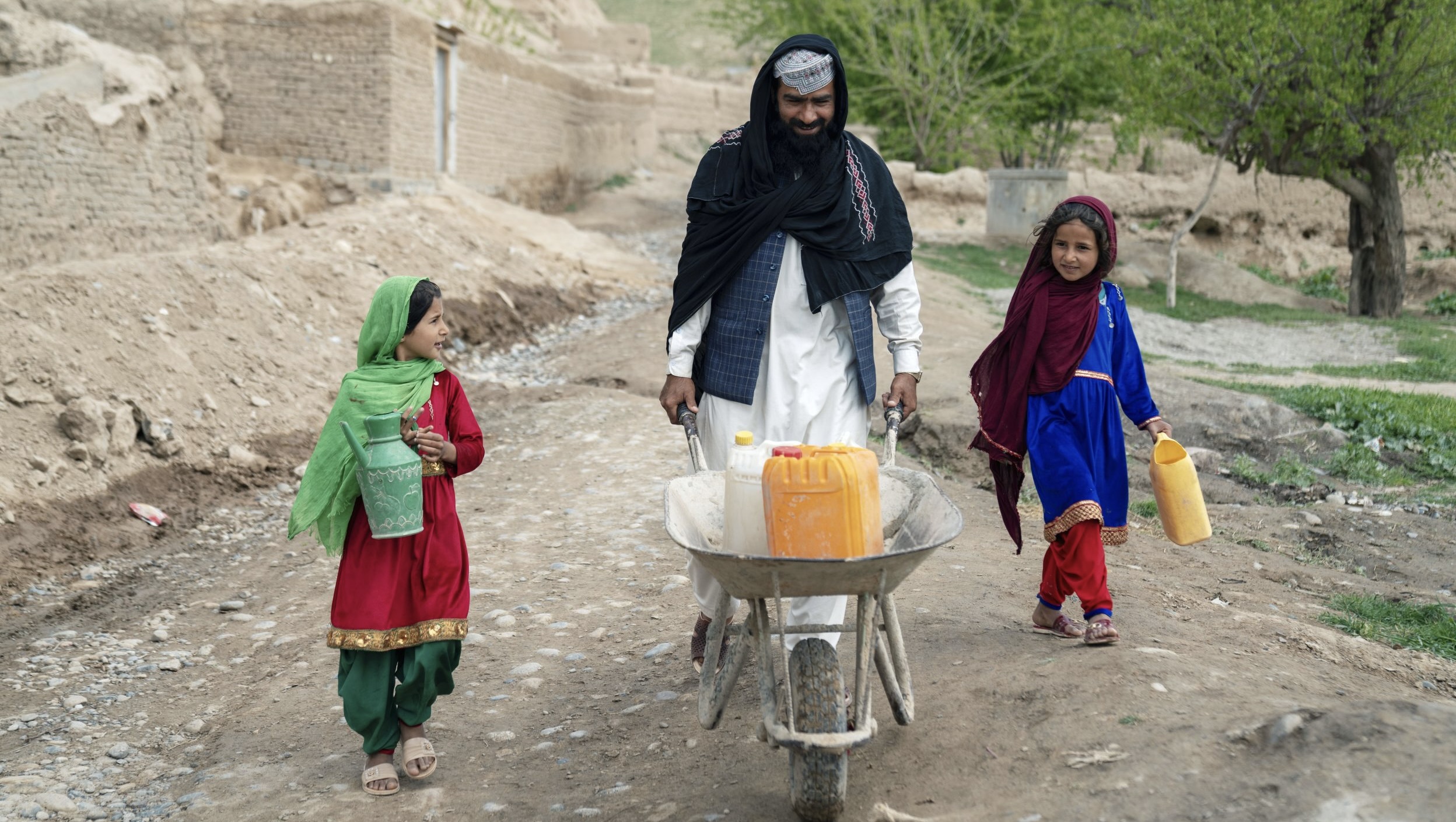
Building Momentum on Strategy 2024-2027
For the World Bank–UNHCR Joint Data Center on Forced Displacement (JDC), 2024 was another key milestone year with the launch of its second strategy, Strategy 2024–2027. The year started strong with a solid, ambitious work program anchored in the priorities of World Bank and UNHCR leadership and operations. The work program was structured around four strategic pillars:
Strategic Priority I: Systematic inclusion in national statistics
Strategic Priority II: Targeted production of high-quality data and timely analysis to inform policy and programs
Strategic Priority III: Data innovation to increase the quality, timeliness, and accessibility of data
Strategic Priority IV: Operationalize data and evidence to strengthen solutions to forced displacement
The JDC convened the first meeting of its new Partnership Forum, which represents the evolution of its strategic consultations with key stakeholders. The forum generated rich and diverse input in support of the work program as well as productive collaboration between forum members. The JDC continued to disseminate and operationalize data and analysis through strategic communications and events; it also worked to fill knowledge gaps through conferences and seminars as well as the regular curation of academic literature on forced displacement. To foster greater accountability for performance and results while leveraging the combined capacity of its parent organizations, the JDC also convened 15 end-of-activity briefings during 2024. These deep dive discussions explored lessons from implementation for future operations as well as the impact of the work on policy making and programming.
The JDC helped shape UNHCR’s drive for more sustainable responses to forced displacement. It highlighted and demonstrated the importance of data and evidence, the inclusion of the forcibly displaced in national statistical systems, and meaningful technical collaboration with development partners to the shift away from subsistence humanitarian aid. The partnership has helped propel the mainstreaming of the inclusion of the forcibly displaced in World Bank data collection, monitoring, and programming as well as inclusion into its core diagnostics, such as poverty assessments and monitoring frameworks, including the global World Bank Group Scorecard.
The JDC is off to a flying start with its Strategy 2024–2027, underpinned by a strong work program spanning seven regions and reflecting the highest level of collaboration between the World Bank and UNHCR to date. This report illustrates some of the highlights and achievements in 2024.
National and Regional Activity Highlights
In 2024, the JDC grew its portfolio of country and regional work. New activities were carefully selected based on their contribution to the JDC’s strategy and their alignment with national and regional priorities, such that they respond to operational data needs, support policy dialogue, and fill important knowledge gaps.
Seventeen of the national and regional activities added to the JDC portfolio were identified by the first joint Call for Expressions of Interest from World Bank and UNHCR teams, which was held in 2024. Of the 66 submissions, more than a third were from joint UNHCR and World Bank teams, and the total funding request was US$26.3 million. Other national and regional activities were mapped to the new strategy given their strong alignment with its strategic priorities. New activities were also added to the work program as strategic and time-sensitive opportunities were identified through the ad hoc funding process of the rolling window.
Inclusion in National Statistics
The JDC’s commitment to working with national statistical systems, thereby building capacity and ensuring government ownership of data production and sustainability, is evidenced by the 64 percent of national and regional activities that include forcibly displaced or stateless persons in national household surveys and censuses.
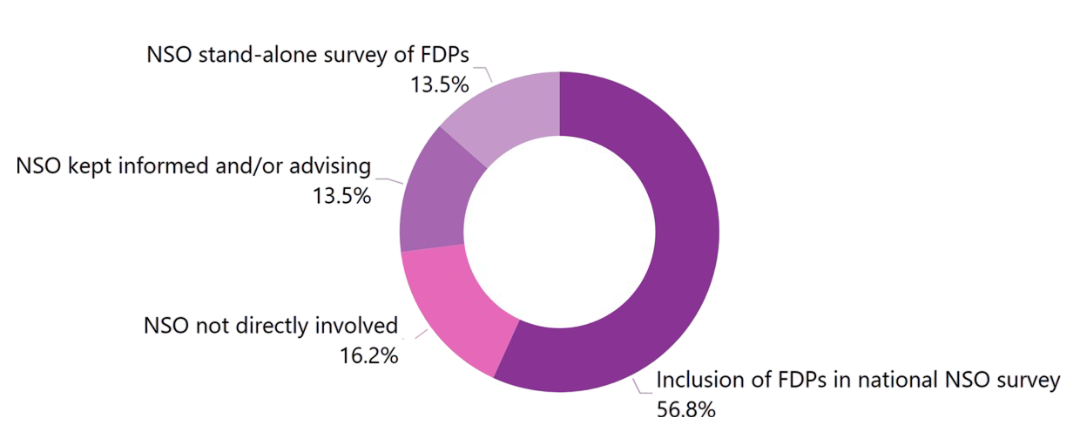
Note: FDP = forcibly displaced person; NSO = national statistical office; as of end of 2024.
In Kampala, the Uganda Bureau of Statistics launched the report on the Uganda Demographic and Health Survey. As a result of the JDC’s support, the survey sampling frame was expanded to include refugee camps for the first time. In addition, the survey’s report includes a chapter on the sociodemographic and health characteristics of refugees, comparing them to those of Ugandans. The report shows that refugee child mortality was lower compared with Ugandans whereas child vaccination rates were higher, and refugee children were more likely to be underweight relative to Ugandan children.
In Honduras, the JDC has helped the National Institute of Statistics identify internally displaced persons (IDPs) in its Permanent Multipurpose Household Survey (Encuesta Permanente de Hogares de Propósitos Múltiples; EPHPM). Pilot IDP identification questions were introduced into the EPHPM in 2023, following the recommendations of the Expert Group on Refugee, Internally Displaced Persons, and Statelessness Statistics (EGRISS). However, IDP identification was complicated by aspects of the specific displacement dynamics in Honduras. In response, in 2024 the team initiated an in-depth methodological validation exercise involving cognitive testing and peer-to-peer technical exchange with Mexico’s national statistical office. As a result of this exercise, the EPHPM fine-tuned the IDP identification questions and of the experience helped EGRISS refine the recommendations on IDP statistical standards.
Global Activity Highlights
In 2024, the JDC continued to draw attention to the opportunities and challenges of forced displacement data on the global stage. Its work helped build consensus for capitalizing on such data and demonstrated the value of doing so in pursuit of more inclusive solutions.
Research conference
In September, the JDC hosted the Third Research Conference on Forced Displacement in Abidjan, Côte d’Ivoire—the first to be held in Africa. The attendance of ministers and senior officials from the governments of the Central African Republic, Côte d’Ivoire, Libya, and Somalia demonstrated the high-level nature of the commitment to this agenda. The feedback from policy makers, practitioners, and academics was overwhelmingly positive, with the conference lauded as a unique contribution to bridging the gap between research and policy on forced displacement.
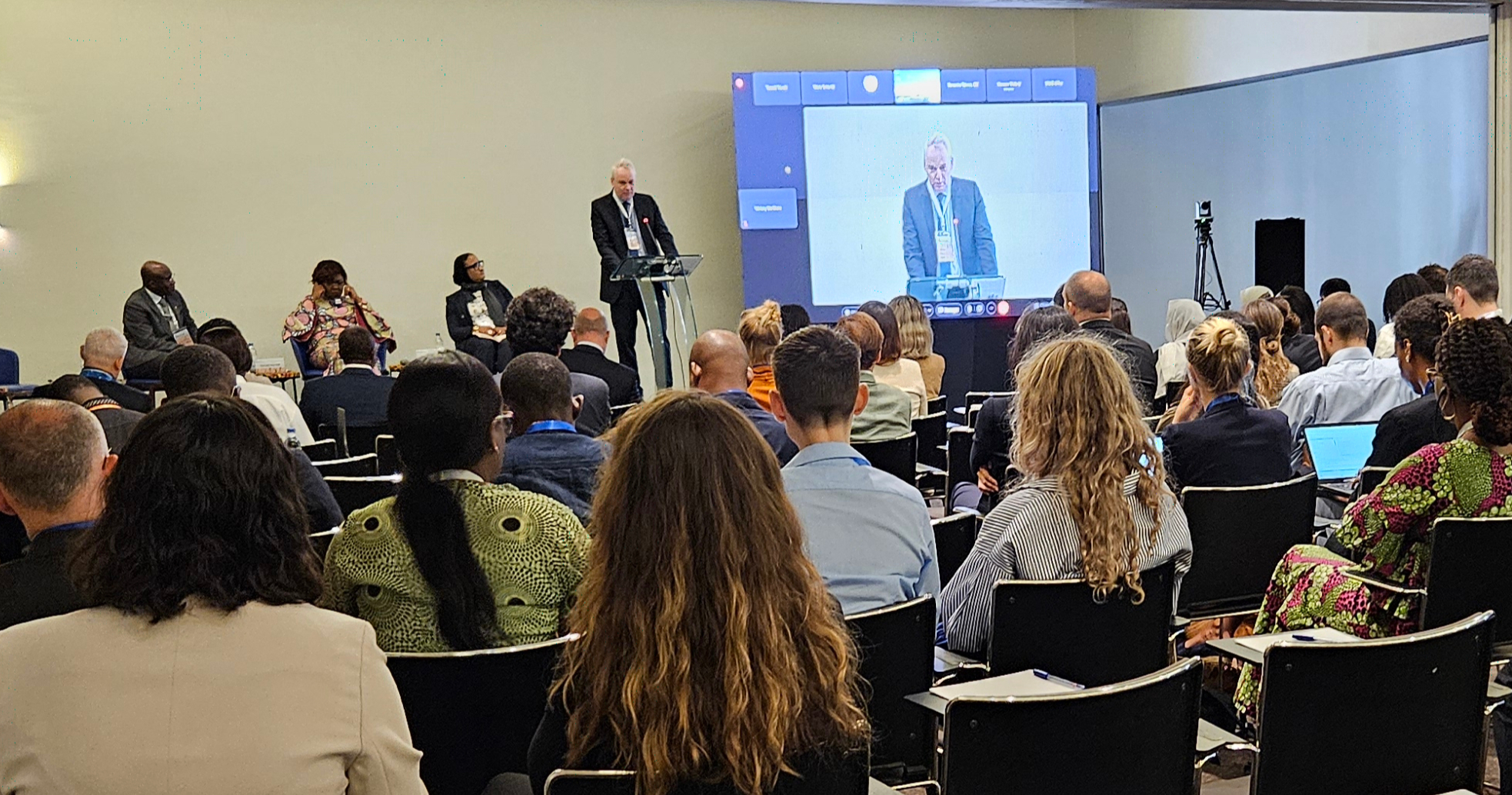
Earlier in the year, the JDC took part in the UN High-Level Political Forum on Sustainable Development. In a side event organized in collaboration with government and UN representatives, the JDC highlighted the criticality of socioeconomic data on IDPs for their inclusion in national policy. The JDC also participated in the World Bank Fragility Forum. During the forum, it showcased relevant JDC work, contributed experience and expertise to sessions on filling data gaps in conflict settings (“more data, more action”), and generating actionable insight on household resilience. The JDC also convened technical exchange to bridge the gap between humanitarian and development data documentation standards to strengthen the connection between humanitarian and development action. Given the attendance of many senior policy makers at the forum, the JDC took the strategic opportunity to launch a regional analysis on the development opportunities in response to the displacement of Venezuelans in partnership with the Inter-American Development Bank, UNHCR, the World Bank, the Organisation for Economic Co-operation and Development, and the Colombian government.
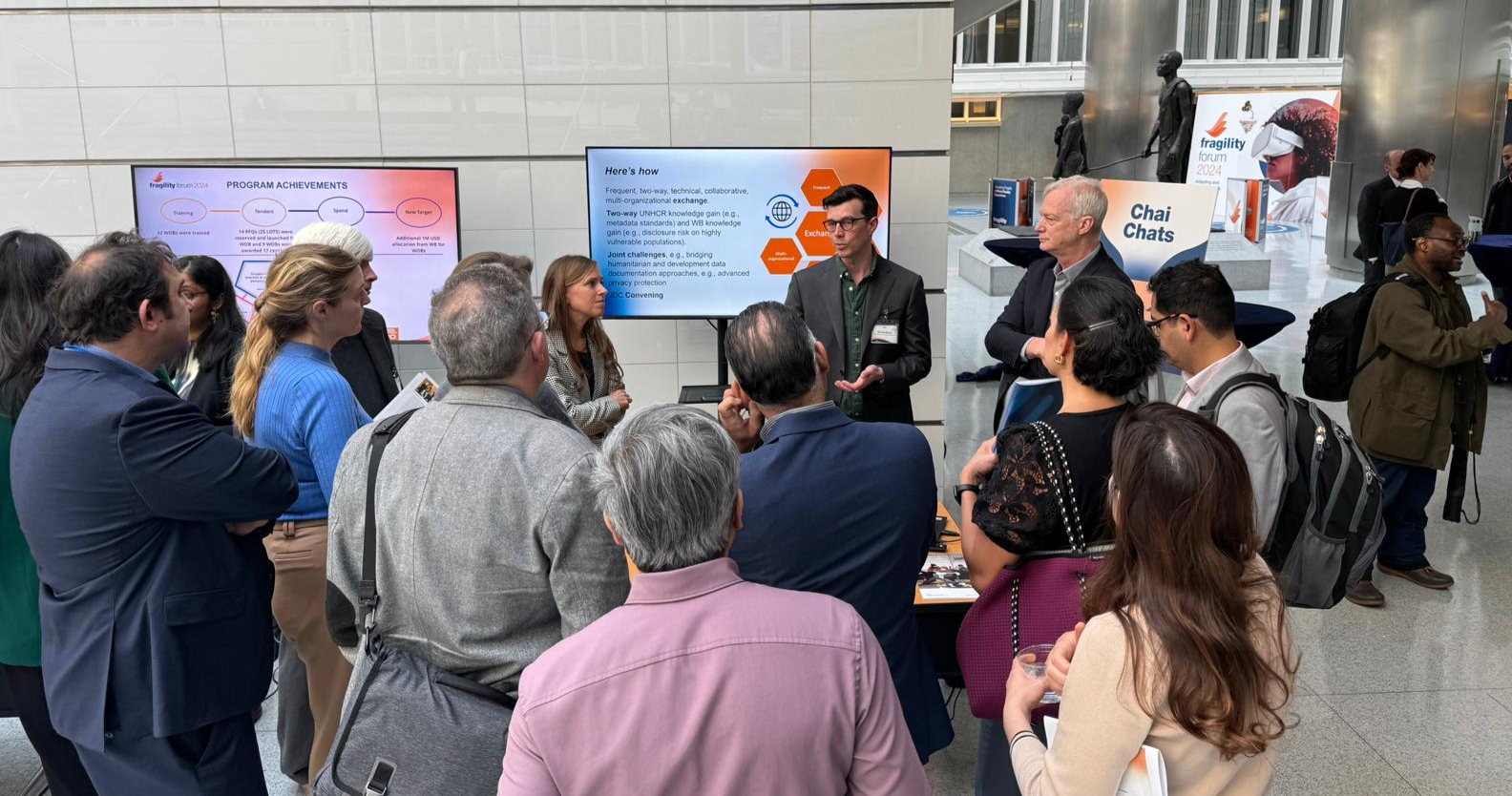
JDC convening a technical discussion with World Bank and UNHCR colleagues at the Fragility Forum.
At the United Nations World Data Forum in Medellín, Colombia, the JDC advanced the discussion of forced displacement as a key data dimension of the global sustainable development agenda. JDC participation strengthened partnerships, facilitated technical exchange, and highlighted the World Bank and UNHCR commitment to robust statistics aligned with international standards. The JDC consolidated this engagement through the Commit to Data campaign, which brings together governments and development actors to catalyze action for better data and improved lives. The JDC committed to further improving the quality, timeliness, and accessibility of socioeconomic data on forced displacement.
In 2024, the JDC also contributed to global standard setting and long-term stakeholder engagement through continued financial, technical, and strategic contributions to EGRISS. The JDC supported EGRISS with the methodology paper Capturing Priority SDG Indicators in Refugee, Internal Displacement and Statelessness Contexts, which analyses data collection and computation methods for 14 prioritized Sustainable Development Goal (SDG) indicators. This paper was launched at the 15th meeting of the Inter-agency and Expert Group on SDG Indicators, where the JDC supported both EGRISS and UNHCR presentations promoting forced displacement as an important dimension of SDG disaggregation. After co-leading the December 2023 Global Compact on Refugees multistakeholder pledge on the inclusion of the forcibly displaced in national statistics and supporting the multistakeholder pledge on economic inclusion and social protection, the JDC contributed additional momentum to this agenda in 2024 by following up on commitments and supporting governments and partners to deliver on them. The annual EGRISS survey of members showed that there were 108 uses of the EGRISS recommendations in 2024, 89 of which were led by countries and 19 by institutions.
Innovative tools
With new emphases on innovation and data use in Strategy 2024–2027, the JDC proactively engaged with partners to develop new ways to address data challenges and to make data and insight more accessible. For example, the JDC convened key partners, including WorldPop and the UK Foreign, Commonwealth and Development Office, to discuss innovative ways to include of the forcibly displaced in national statistics. The JDC facilitated knowledge and technical exchange involving JDC-supported work by the World Bank and UNHCR at the inaugural Humanitarian Data Forum. The JDC also prototyped innovative tools to demonstrate what works, how to make data more accessible, and how to lower the barriers that hinder impactful use of alternative data sources.
One of these JDC-built prototypes, the Questionnaire Finder, uses a reproducible analysis to assess and label household survey questionnaires that are available on the UNHCR Microdata Library and presents them in an easily searchable dashboard. The Questionnaire Finder,is now hosted and maintained by UNHCR to promote methodological consistency and data quality, as well as to reduce the duplication of effort across teams and organizations.
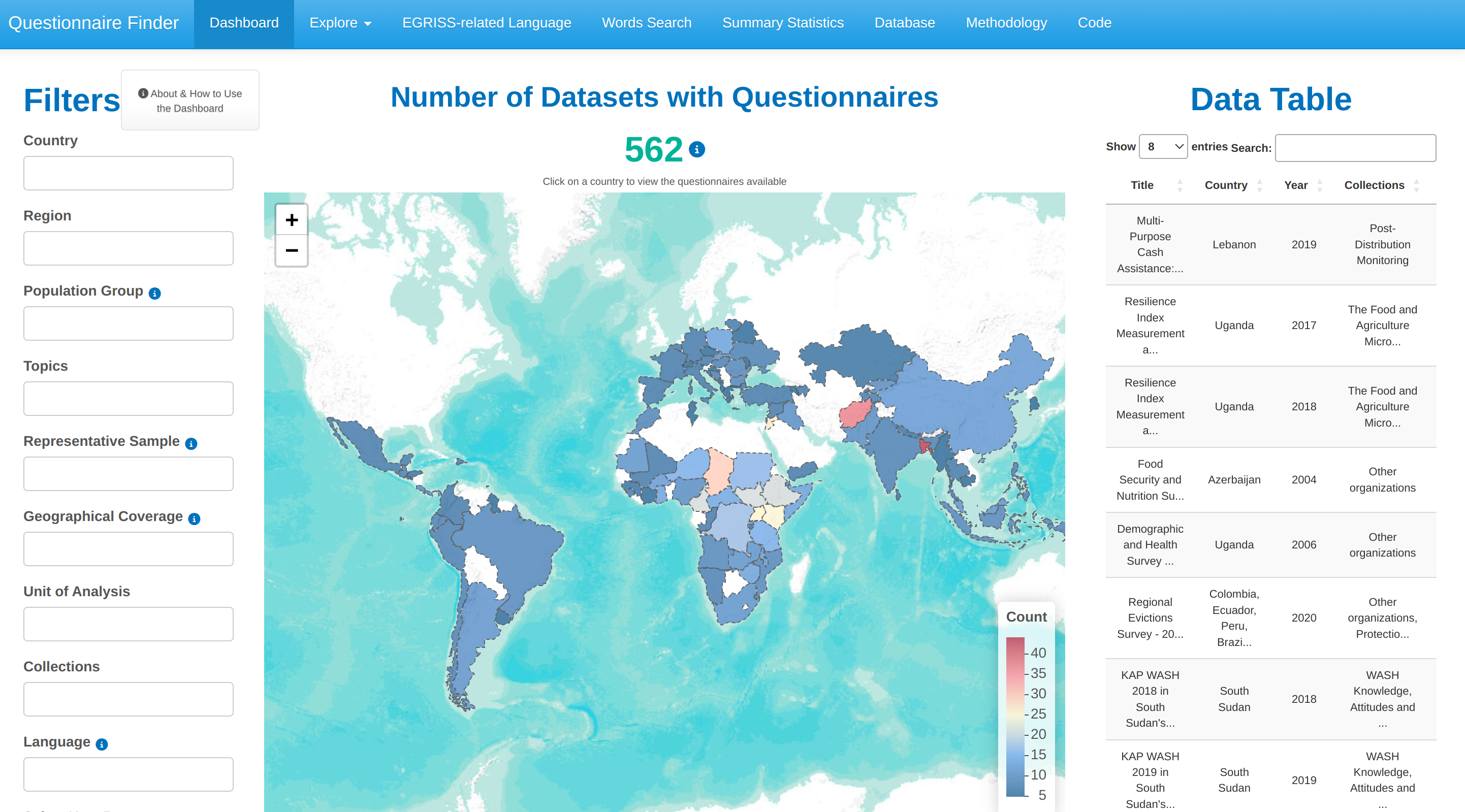
Another innovative tool, the Open Buildings Explorer, integrates UNHCR geospatial data with open data to inform survey sampling approaches in forced displacement contexts. The JDC piloted this proof-of-concept tool at a workshop on the inclusion of the forcibly displaced in the Harmonized Survey on Household Living Conditions (EHCVM) in Lomé, Togo. The workshop was attended by officials from 10 national statistical offices as well as by World Bank and UNHCR survey specialists.
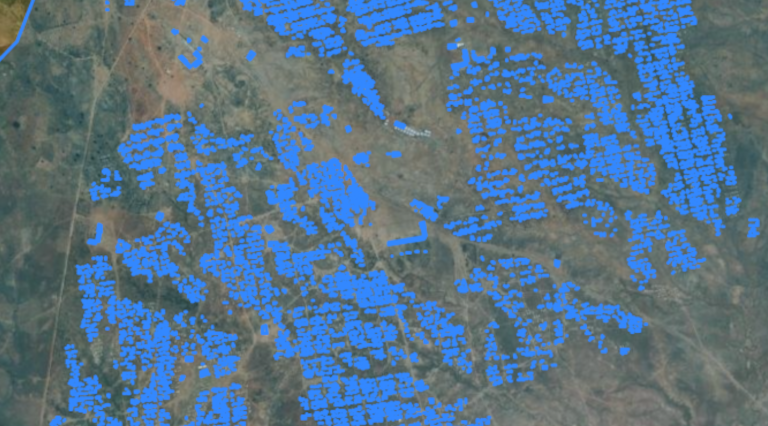
Dissemination, Communication, and Data Accessibility
The JDC continued to increase the visibility of resources through its newsletter, literature review, research digests, and data updates. It also invested in the effective use of socioeconomic data by developing and launching the public Learning from the Evidence on Forced Displacement e-learning training course in collaboration with the Building the Evidence on Forced Displacement research partnership, which was attended by 151 people from more than 10 organizations.
On data accessibility, the JDC continued to support UNHCR to evolve its statistical data architecture and data quality frameworks to enable the dissemination of thematic statistics on well-being and living conditions in forced displacement contexts. These indicators will be made accessible alongside UNHCR population statistics, delivering complementary insight from survey data to a wide audience of policy makers and practitioners. The JDC also worked with the World Bank to disseminate the Dataset of World Refugee and Asylum Policies (DWRAP), the first global dataset of de jure asylum and refugee policies featuring data from 193 countries from 1952 to 2022. DWRAP is now publicly available and can be accessed through its associated platform.
Moving forward
The current upheaval triggered by decreasing official development assistance and humanitarian aid poses a significant challenge to realizing the JDC’s full potential during its four-year strategy. However, the JDC’s mission is needed more than ever to support a transition to more effective responses to forced displacement in the medium and long term. Therefore, the JDC will leverage existing resources and place a premium on delivering results that demonstrate impact.
Over the next three years, the JDC will target its resources and technical support toward bridging data and evidence gaps to underpin government, development, and humanitarian action on forced displacement by focusing on the seven areas described below.
Transformative activities that address contextual, technical and financial barriers to the inclusion of the forcibly displaced, especially by leveraging and enhancing existing initiatives.
Targeted analysis to improve and accelerate access to services and opportunities for self-reliance, climate resilience and preparedness for the forcibly displaced and host communities, and return and reintegration efforts.
Themes on which additional data and evidence can generate new knowledge on how financing can be used more strategically to address forced displacement in development contexts.
Strengthening the complementarity of protection and socioeconomic data through integrative analysis for comprehensive policy recommendations that meaningfully address immediate needs as well as long-term development.
Opportunities to inform the World Bank’s new policy-oriented diagnostic tool, the “Poverty and Equity Assessments” to open pathways for greater inclusion of the forcibly displaced in World Bank strategies, operations and policies.
Partnerships, catalyzing constructive engagement and coalition building between research and policymaking stakeholders to strengthen evidence-based decision making.
Countries prioritized to deliver the IDA21 Policy Commitment on Data for Evidence-based Policy Making and for UNHCR’s Sustainable Responses through supporting the collection, dissemination and use of household survey data.

Acknowledgements
The JDC would like to thank the individuals, organizations, governments, and national statistical offices who collaborated with and supported the center in achieving its objectives, particularly, the guidance provided by the Management Committee and Partnership Forum. The JDC would also like to extend its appreciation to its partners for their generous financial contributions and steadfast support in 2024: the government of Denmark, represented by the Danish Ministry of Foreign Affairs; the European Union, represented by the Directorate-General for International Partnerships at the European Commission; and the U.S. government, represented by the U.S. Bureau of Population, Refugees, and Migration.


